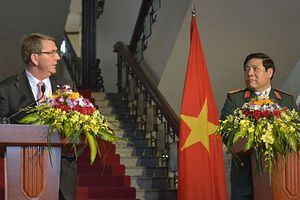For Vietnam, 2016 seems fated to be a crucial year. Hanoi’s sovereignty disputes and related diplomatic efforts will be impacted by ongoing changes in Russia, China, and Japan and, yes, the results of the United States’ presidential election.
The role of Russia is of particular interest for Vietnam. On April 14, Vietnamese shipyard Ba Son launched two Russian-designed Project 12418 Molniya-class guided missile corvettes built under license for the Vietnamese Navy after 30 months of construction. Russia is still Vietnam’s long-time partner in military-technical cooperation, but the relationship is not trouble-free.
The same day, the spokesperson for Vietnam’s Ministry of Foreign Affairs, Le Hai Binh, voiced concerns about Russian Foreign Minister Sergey Lavrov’s previous comments about the internationalization on South China Sea disputes.
“Issues that involve all relevant parties, namely the disputes over the Truong Sa [Spratly] archipelago, must be settled by all countries concerned,” Binh said. He added that Vietnam would stick to its position of seeking to solve the disputes through peaceful measures based on international law, especially the United Nations Convention on Law of the Sea (UNCLOS), and in the spirit of the Declaration on the Conduct of parties in the South China Sea (DOC).
Binh’s statement reflects the thoughts of many Vietnamese people about Russia’s position. Some no longer trust much in the Russian-Vietnamese friendship, arguing that Russia has changed since the days of the Soviet Union. Yes, there are hopes in Vietnam that Russia could take a more proactive stance on the South China Sea issue. On the other hand, there are also hopes that the United States can help Vietnam more by lifting the arms embargo completely.
The Obama administration seems willing to do this. Its positive attitude toward Vietnam was also highlighted in the visit of U.S. Secretary of Defense Ashton Carter to Vietnam in 2015, and the U.S.-Vietnam Joint Vision Statement on Defense Relations. At the same time, Vietnam and the United States are negotiation on U.S. use of Cam Ranh Bay, considered the finest deepwater port in Southeast Asia. These moves are part of a general warming in Vietnam-U.S. relations.
Public opinion in Vietnam is now splitting into two main camps with differing foreign policy recommendations: make the best of U.S support or seek Russia’s instead.
When Russia openly opposes the internationalization of South China Sea disputes–in other words deciding not to commit to Vietnam’s interests–Vietnam may think different about this choice. After the annexation of Crimea and the conflicts in Syria and Ukraine, Russia seems to be feeling that now is the time to prioritize relations with China. Thus Moscow joined Beijing in opposing the G7 joint statement about the South China Sea.
That makes it more attractive for Vietnam to lean toward the United States. Unfortunately, support from the United States is also hanging in the balance, as much will depend on the next U.S. president.
Where else can Vietnam seek support and an advantage in its dispute with China? The passage of Japan’s new security bills last year, allowing Japan to conduct limited military operations abroad and sell arms to foreign countries, may help. In February, two Japan Maritime Self-Defense Force P-3C patrol aircraft visited Vietnam’s Da Nang for three days. This was just one sign of a new stage in Vietnam-Japan military cooperation amid tensions over the South China Sea. These two countries at least have a similar problem to focus on: China.
Vietnam is facing urgent challenges in defending its sovereignty and conducting diplomacy. Vietnam is frustrated by Sergey Lavrov’s comments even while stuck waiting for the next change in the U.S presidency. Most of all, Hanoi is hoping for some sort of intervention from the international community over the South China Sea disputes. Achieving this goal, however, will require immense diplomatic efforts this year.
Du Nhat Dang is a reporter for Thanh Nien newspaper. He graduated from the Faculty of Journalism and Communication, University of Social Sciences and Humanites in Ho Chi Minh City.

































